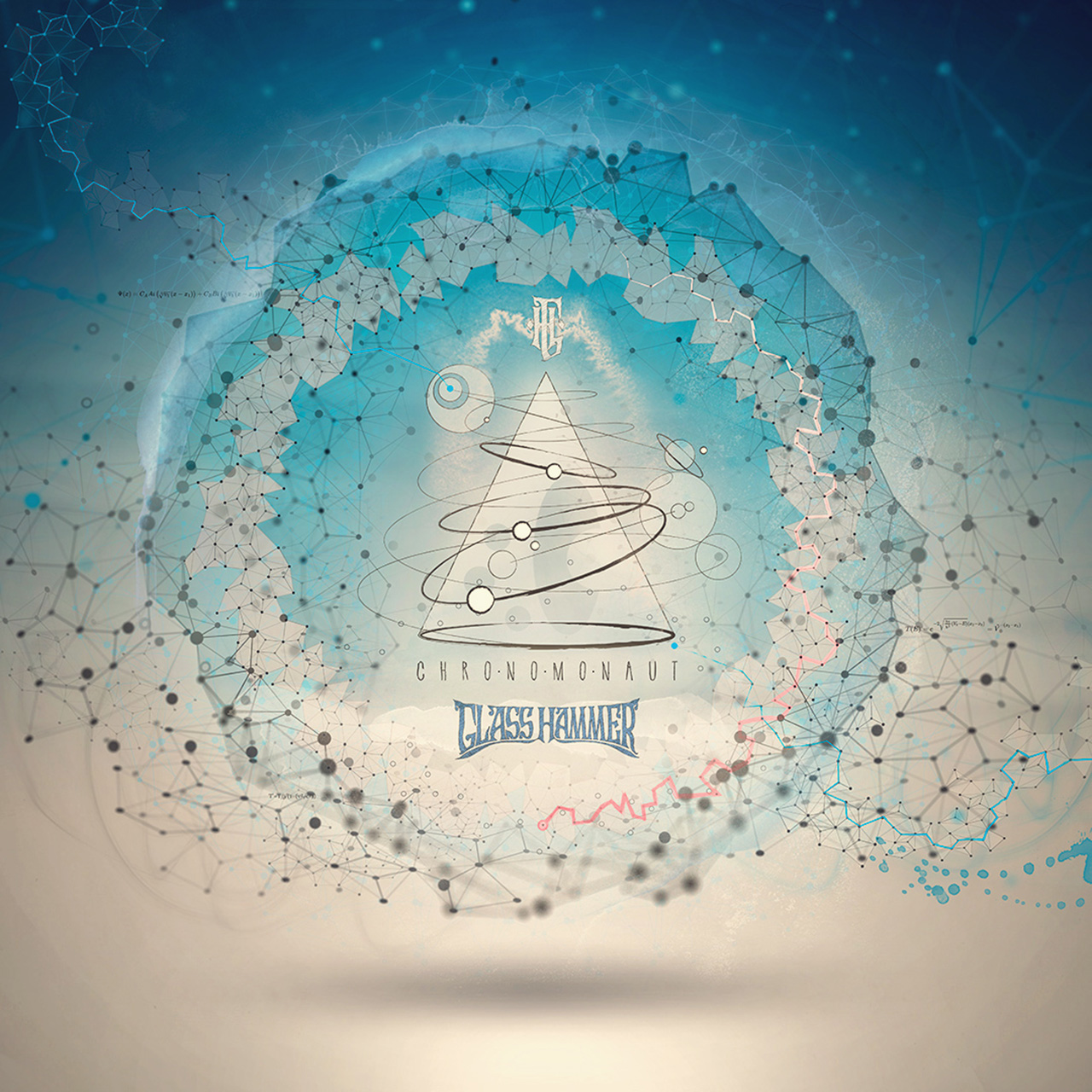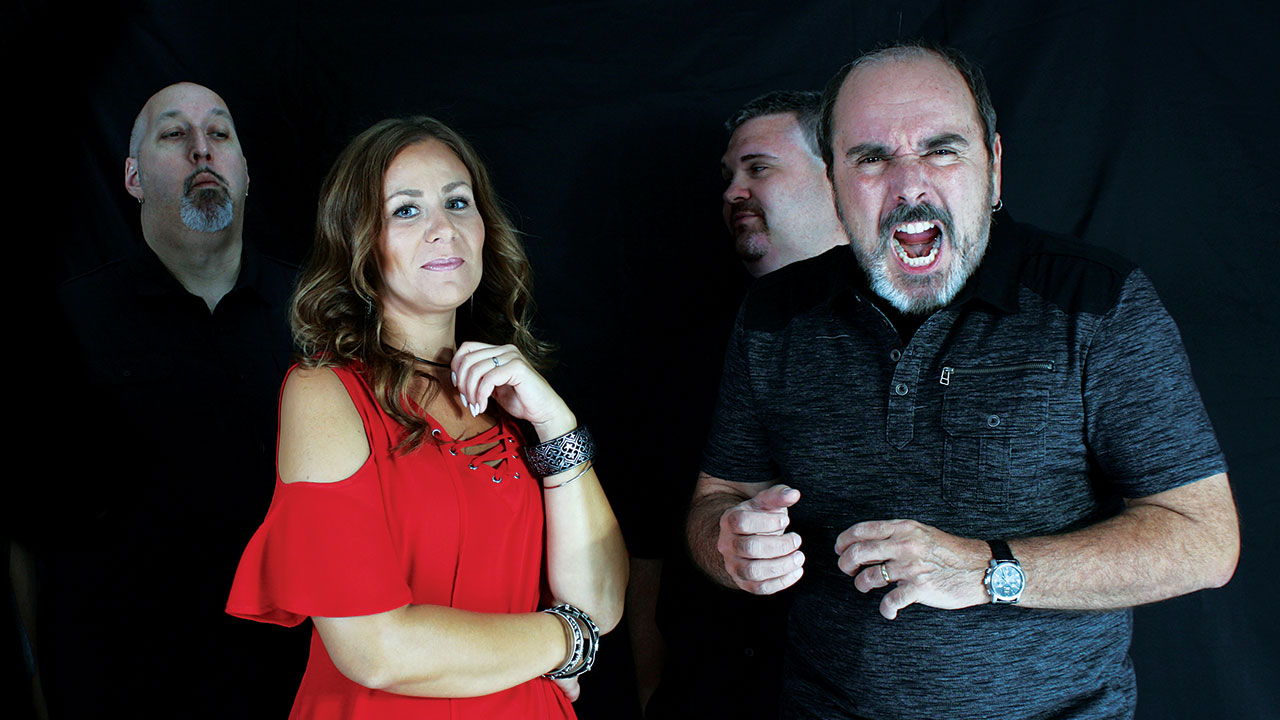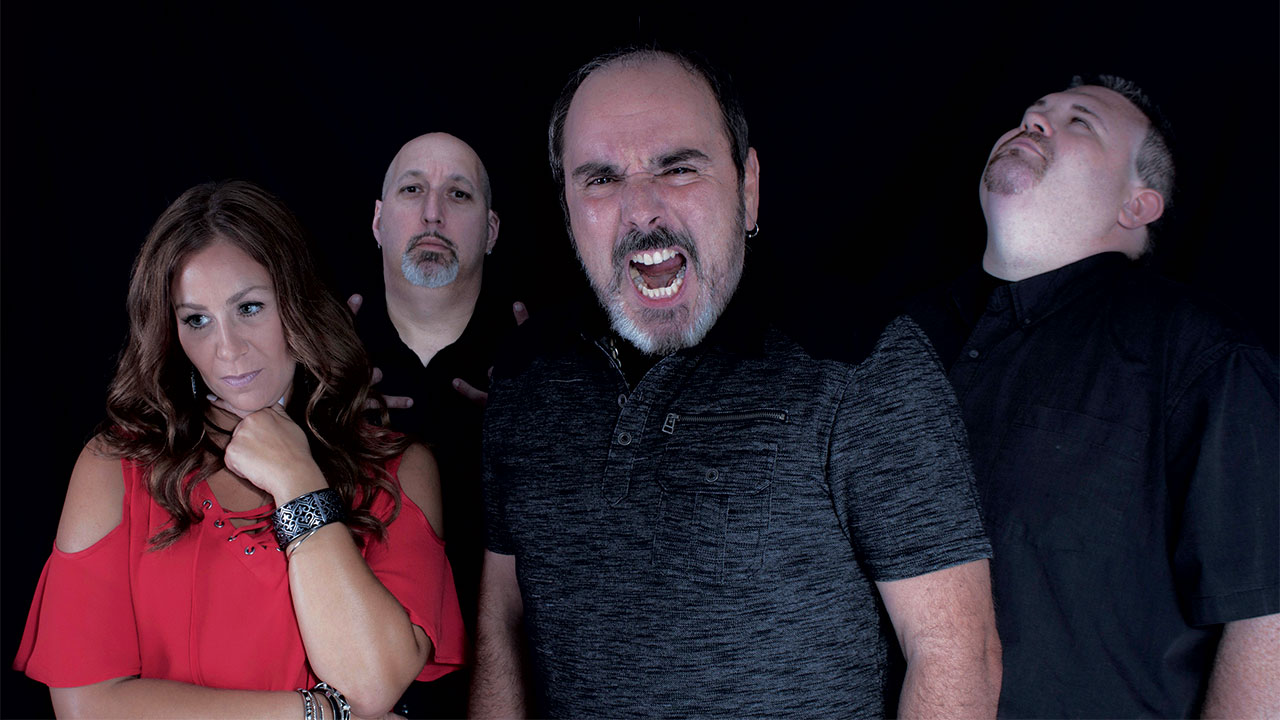US prog rockers Glass Hammer returned to the concept of 2000's Chronometree with 2018's Chronomonaut. Prog sat down with founding members Steve Babb and Fred Schendel to get the whole story
We can’t imagine many things more prog than a concept album about a music lover who believes aliens are trying to communicate with him through the records he’s listening to. But how on earth do you take that one step further? Glass Hammer managed to do so by revisiting the prog obsessive 18 years later, only to find him wanting to time travel back to the 1970s.
Welcome to Glass Hammer’s new record, Chronomonaut, that sees that protagonist, superfan Tom, start his own band in a ploy to go back in time in the hope of becoming a prog god. The Tennessee prog rockers have their tongues planted firmly in cheek throughout the 12 tracks as they follow up 2000’s Chronometree, but there are deeper themes of loss and nostalgia seeping into the songs, too.
“I refer to something I call chronic nostalgia,” says bassist Steve Babb, whose Chris Squire-esque punch resonates throughout the record.
“It’s the idea that you can just look back: your favourite prog rock albums can tkae you back in time. Sometimes we romanticise the good old days, and that’s another thing about the album. The story is that if you could go back in time, would it be what you thought it was?
“Tom finds out that it’s not at all. We try to teach him a lesson as the story goes on, and it does reach a conclusion this time. I’m not sure there’s anymore to tell of Tom’s story. But he’s found you have to move forward to get ahead.”

Glass Hammer, it seems, are always moving ahead. The group – guided by Babb and venerable sidekick, keyboardist/guitarist Fred Schendel – have been on a steady journey upwards since forming in 1992, valiantly conjuring up an impressive 18 studio albums.
Their latest Chronomonaut is more of the same melodic, symphonic prog rock, sprinkled with saxophone, that has one foot firmly planted back in the 1970s and 80s, and the other resolutely pointing forward.
The story of Tom cleverly pokes fun at prog rock and its many foibles and eccentricities, and it is perhaps about as ‘meta’ as you will get within these pages as it delves inside our beloved genre.
The character, though, isn’t some lyrical flight of fancy from Glass Hammer, with the narrative surprisingly based somewhat on real life.
“There was a person who I knew probably back when I was in my 20s in the early 80s, who was a big rock fan and wanted to be a musician, but never quite found the right vehicle for that to happen,” recalls Schendel.
“He was so deeply into his albums and the lyrics on the albums… I don’t know how much of it was real and how much of it was him putting things on for the sake of fun, but he took prog album lyrics and concept albums seriously to the point of conspiracy theories, and was finding hidden meanings and messages to himself.
“When we did the original Chronometree album back in 2000, we kind of loosely based a character on the notion of, what if somebody really became convinced that the music was a direct communication to him?”
“I thought enough time had gone by and enough things had happened in prog rock, mainly that a lot of the iconic musicians and writers and artists have passed away in the last few years, I thought, well, what would have happened to this character over time, what happens when he gets to his 40s or his 50s?” adds Babb.
“We made the whole thing a kind of a flip of the other album, and instead of wanting to time travel into the future, now he wants to go back to the past and try to live out the life of a prog rock god. He just kind of represents everybody at every level that’s involved in prog. From people like you to people like me, that just love the albums and stare at all the covers and read every lyric. Of course, he’s a little crazy… but aren't we all?”
Babb and Schendel are speaking down the line from their recording studio, which they co-run as their day jobs, during a break in sessions. Later on in the day a “pop/industrial/goth” singer is due in to record, and it sounds as if the pair are going to try to do their bit for prog and gently push her towards a more experimental sound.
Chronomonaut was mainly recorded in this studio, with the group doing most of
the work in the spring. Babb and Schendel brought demos in, with Aaron Raulston tracking drums and the pair then “adding the people where they needed to be added”. Susie Bogdanowicz returned to provide some flighted vocals, while Discipline’s Matthew Parmenter and Chris Herin both guest on the record, too.
“I’m thrilled to death that they said yes,” Schendel says as he recalls working with the Discipline duo.
“Matthew, in particular, was a case of where I kind of wrote that song hearing that voice in my head,” Babb adds. “I was like, ‘If he says no, I’m not really quite sure what we’re going to do.’”
The polished Chronomonaut, which is likely to arouse the senses of fans of Ayreon’s folk meanderings and Pink Floyd’s lead guitar endeavours, feels a long way from Glass Hammer’s early material. Babb and Schendel first met in 1986 and later launched an electronic project after a number of years twiddling thumbs, imbibing the sounds of Tangerine Dream for their first collaboration.

But it was a venture into their passion for The Lord Of The Rings that saw the pair release their first record, the Tolkien-themed Journey Of The Dunadan, under the Glass Hammer name in 1993.
They never expected, however, to soon have their 70-minute concept album showcased to tens of millions of people on TV in what could quite possibly be the most ‘un-prog’ piece of promotion ever to have fallen onto the laps of
a fledgling rock band.
“We made the album having no idea what would happen, and frankly I didn’t expect anybody to buy it at all,” Babb admits. “But we did start with some advertising in magazines, and the internet was really useless at that point. But the magazine ad caught the attention of the QVC Shop At Home network here. People still spend lots of money and time trying to get on that show.
“In our case they called us and put us on TV for 15 minutes in front of 20 million or 30 million viewers, and boom, it happened.”
The unexpected exposure, with their CD no doubt rubbing shoulders with far-too-shiny jewellery, futuristic kitchen utensils and presenters so enthusiastic they’d probably knocked back five Red Bulls before going on set, gave Glass Hammer the financial backing to explore their true calling: prog. The sci-fi fantasy nods were stripped back in favour of indulgences in the vein of Yes, Genesis and ELP as the band began to cement their place in the progressive rock community.
The Yes links don’t end there, however. Jon Anderson provided some vocal textures on the band’s 2007 release, Culture Of Ascent, before Jon Davison joined a couple of years later to act as lead vocalist on a handful of albums. Davison, of course, went on to team up with Yes on a full-time basis in 2012, causing bittersweet feelings to cauldron up inside Glass Hammer as their vocalist left to graduate to bigger things.
“I always knew instinctively that he would be in Yes, and I don’t know how I knew that, but he just fit so well and the reviews from the first album that we did with him were kind of head-turners,” Babb says of his former bandmate. “Something had happened with Glass Hammer at that point. He’s an incredible singer and a great person to work with. He had connections, but they would have found him like I found him. I found him watching him sing Yes on a YouTube video. We really only wanted him to sing one song, because we had worked with Jon Anderson too, but we got along so well it was like, ‘Oh, let’s continue on.’ Susie [Bogdanowicz] had moved onto Florida at the same time and we didn’t really know how we were going to make things work with her. But it was just timing.”
Davison did revisit his Glass Hammer past earlier this year, though, performing finales with the group on Yes’ Cruise To The Edge floating prog jamboree. “We’ll probably do some more with him in the future,” Babb hints. “I think he wants to.”
Like Davison, various musicians have drifted in and out of the Glass Hammer machine, but its engine room has resolutely remained Babb and Schendel since day one. The dynamic duo admit they don’t cradle many long-term plans in their palms – but the cogs are always turning. An often modest live schedule means that the band’s nucleus places songwriting first, rather than performance.
“As a lyric writer and a storyteller, that part of me is already kind of thinking of revisiting a couple of other Glass Hammer albums that could stand with a part two,” Babb says, attempting to gaze into the future. “I’m not sure that’s what we’ll do, but that’s kind of what we’re thinking. We’ve also talked about, not really a side project, but a supplemental album to Chronomonaut, where we do more electronic, Tangerine Dream-influenced music that might come out next year – we’ll just have to wait and see. Nothing’s firm at the moment. We’re kind of recuperating from the whole recording and producing phase.”
At the time of writing, Glass Hammer have no shows locked into the schedule – a move which would be considered eyebrow-raising for many, seeing as they have a new product to promote. But it seems to fit. They are a band who don’t write on the road, so downtime in the studio is the most fertile setting for inspiration.
“To go out and play live all the time and really function in that world requires a commitment of pretty much doing it constantly,” Schendel adds. “It’s hard to get the right mindset if you’re doing it part-time, and with families and the studio and all the other things that demand attention in your life, I find myself very concerned every time we decide to play some live shows. Can I put my ageing brain and fingers into shape to where they’re going to do what they’re supposed to do?”
One reason why Glass Hammer have endured since the early 1990s, where others may have slipped away, may rest with their knack for mustering up masterful melody. Susie Bogdanowicz’s vocals help to bring extra finesse, and the band aren’t ones for being technical for the sake of flexing their adroit muscles. Each note is considered, each vocal line measured.
“I don’t want to be impressed with music so much as I want to be moved,” Babb says. “I’ve been impressed before and, for me, it’s boring after a while. I would rather have music that’s meaningful. And if it can be technically impressive at the same time, great, I’m going to like it even more. But for me it’s about the emotional impact of the song and the music.”
You wouldn’t bet against Glass Hammer still churning out their symphonic prog rock when they reach their 30th anniversary in 2022. Who knows what number album they may be on then, but their songwriting nous doesn’t look set to dissipate anytime soon.
“I think we’ve hit some spots in our music before that I’m really proud of,” Babb reflects with some degree of satisfaction. “We did some things that were beyond us. I got to sit with Jon Anderson for a while years ago and I asked him about how Yes’ Awaken was written. He said the same thing, that it was more than the band – something happened and it was more than they were capable of. That’s how I feel about few of the things Fred and I have done with Glass Hammer, that it came from somewhere else and it feels like you’re like a vehicle for something really amazing. I don’t know really what it is, but that’s how it feels.”

